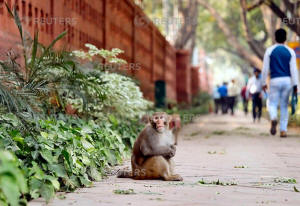|
Monkeys run amok in India's corridors of
power
 Send a link to a friend
Send a link to a friend
 [December 11, 2018]
By Malini Menon and Sunil Kataria [December 11, 2018]
By Malini Menon and Sunil Kataria
NEW DELHI (Reuters) - India's government
faces a tough re-election battle next year but first it must deal with
an opponent as wily as any political rival, troops of monkeys that have
become a big threat around its offices in New Delhi.
Red-faced rhesus macaques have spread havoc, snatching food and mobile
telephones, breaking into homes and terrorizing people in and around the
Indian capital.
They have colonized areas around parliament and the sites of key
ministries, from the prime minister's office to the finance and defense
ministries, frightening both civil servants and the public.
"Very often they snatch food from people as they are walking, and
sometimes they even tear files and documents by climbing in through the
windows," said Ragini Sharma, a home ministry employee.
Ahead of Tuesday's start of parliament's winter session, an advisory to
members of parliament last month detailed ways they could keep simian
attacks at bay. Don't tease or make direct eye contact with a monkey,
the advisory said, and definitely don't get between a mother and her
infant.

The rapid growth of cities has displaced macaques, geographically the
most widely distributed primates in the world after humans, driving them
into human habitats to hunt for food.
Many in Hindu-majority India revere and feed the animals they consider
to be connected to the demigod Hanuman, who takes the form of a monkey.
"This socio-religious tradition of feeding has created a vicious cycle,"
said ecology researcher Asmita Sengupta.
"They become used to being fed by humans and lose their sense of fear,"
said Sengupta, of the Ashoka Trust for Research in Ecology and the
Environment.
"They start actively seeking supplementary food and if we don't feed
them, they turn aggressive."
'APE REPELLERS'
The monkeys have hardly proved an ally for Prime Minister Narendra Modi.
Hundreds of macaques feasting on optic fiber cables strung along the
banks of the river Ganges derailed his plan to roll out wifi in his
constituency, the crowded 3,000-year-old holy city of Varanasi, in 2015.
[to top of second column]
|

A monkey sits on a pavement outside India's Parliament building in
New Delhi, India, November 15, 2018. REUTERS/Anushree Fadnavis

Men were hired to swat the monkeys away with broomsticks and
slingshots, when then U.S. President Barack Obama toured New Delhi
that year, media said.
Some monkey-human encounters have turned tragic.
In 2007, monkeys pushed the deputy mayor of Delhi, S.S. Bajwa, off
his balcony to his death. Last month, one of the animals snatched a
12-day-old boy from his mother and killed him in Agra, home to the
famed monument to love, the Taj Mahal.
Monkeys have bred rapidly in Delhi and neighboring states as they
have protected status, but there is no official estimate of their
numbers.
India has tried several strategies to fight the menace.
Several years ago, it brought in larger, black-faced langurs, feared
by the macaques, to patrol key areas but that stopped after it
became illegal to keep langurs in captivity.
Authorities stumbled on a partially successful solution four years
ago, after hiring 40 men to disguise themselves as langurs and
squeal monkey-like to try and terrify the macaques away.
"We call them 'ape repellers' and they are contract employees," said
a government official, who asked not to be identified. The stratagem
works temporarily as the monkeys flee on hearing the calls, but they
return once the men depart.
Primatologist S.M. Mohnot recommends sterilization and moving the
animals to forests, as well as lifting a ban on their capture for
biomedical research and resuming exports of the macaques, as
components of a solution.

"The monkey menace can be checked only by a multi-pronged approach,"
said Mohnot, the chairman of the Primate Research Centre, a federal
institute in the western city of Jodhpur.
(Writing by Malini Menon; Editing by Martin Howell, Clarence
Fernandez and Darren Schuettler)
[© 2018 Thomson Reuters. All rights
reserved.]
Copyright 2018 Reuters. All rights reserved. This material may not be published,
broadcast, rewritten or redistributed.
Thompson Reuters is solely responsible for this content. |